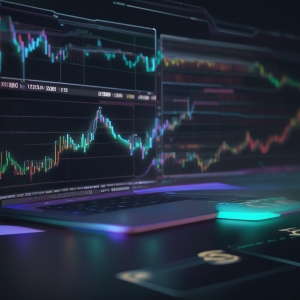Table of Contents:
Introduction and the Value for the Readers
For many years, traditional finance has stood unchallenged. Today, the rise of DeFi is turning the tables, bringing in a wave of decentralization to the world of finance. This article will demystify DeFi or Decentralized Finance and highlight how this groundbreaking concept is revolutionizing trading. Whether you're a hopeful investor, a curious observer, or a total newbie to the world of cryptocurrency, this article is for you. It aims to deepen your understanding of DeFi, its importance, and how you can use this knowledge to your advantage in the ever-evolving digital landscape.
Understanding DeFi: A Basic Explainer
So, what exactly is DeFi? At its core, DeFi, or decentralized finance, is a movement that leverages blockchain, the technology behind cryptocurrency, to transform old financial products into trustless, transparent protocols that run without intermediaries.
In simpler terms, DeFi removes the need for traditional financial intermediaries like banks, brokers, and exchanges. Instead, all operations are transparently performed on a blockchain network - an immutable and secure public ledger.
With the rise of DeFi, ordinary individuals can now participate in financial activities that were previously limited to institutions - from lending and borrowing to insurance and trading. The goal is to make financial systems more accessible, efficient, and democratized.
Advantages and Disadvantages of Decentralized Finance (DeFi) in Trading
| Pros | Cons |
|---|---|
| Increased accessibility to financial services | High risk due to lack of regulation |
| Greater transparency in transactions | High Volatility |
| Potential for higher returns | Lack of legal recourse in case of fraud |
| Faster and cheaper transactions | Dependence on technology and risk of technical failures |
| Freedom from traditional banking fees | Privacy and Security issues |
A Look at the Early Days of DeFi

The rise of DeFi wasn't instantaneous. Like any technological innovation, it bore its beginnings in the minds of visionary thinkers. The first practical DeFi application was Bitcoin, a decentralized cryptocurrency created in 2009 by an elusive figure known as Satoshi Nakamoto. Bitcoin introduced the broader concept of decentralization through blockchain and opened the road for more advanced DeFi applications.
Following Bitcoin, projects like Ethereum took decentralization a step further with the addition of smart contracts - self-executing contracts with the terms directly written into code. Ethereum became a breeding ground for many modern DeFi projects due to its flexibility and sophisticated blockchain infrastructure.
Stepping into 2013-2016, the DeFi was relatively quiet with only a few projects making it to the mainstream. However, the potential for creating a truly decentralized financial ecosystem was becoming increasingly apparent. Fast forwarding to now, DeFi has grown at an exponential rate, with over $40 billion locked in DeFi protocols as of March 2021 – a truly remarkable feat considering its humble beginnings.
The Present State of DeFi and Its Impact on Trading
As we approach the present day, DeFi has unquestionably left its mark on the financial landscape. The marketplace has seen a deluge of innovative projects, each aiming to decentralize various aspects of traditional finance. From decentralized exchanges (DEXs) like Uniswap and lending platforms like Compound, DeFi is reshaping the financial landscape.
Decentralized trading platforms have become one of DeFi's most significant achievements. They allow for open and automated trading, free from a central authority's control, thereby enabling a truly open market. This remarkable development has brought about a seismic shift within the sphere of trading.
With DEXs, traders can take control of their assets, eliminating the need for middlemen and offering increased profitability due to lower commission fees. As a result, DeFi has turned many traditional trading strategies on their heads, introducing concepts like liquidity pools and yield farming as alternatives to conventional trading methodologies. With DeFi, the trading game is changing in favour of the end-users, marking a new era in the financial industry.
Not only has DeFi improved the process of financial transactions, but it has also increased transparency and safety in the trading industry. Every transaction on blockchain technology is secured and traceable, providing even more opportunities to hedge risks and make strategic decisions about trades. This is something that was challenging to achieve under the old financial setup. The rise of DeFi has blown wide open the doors of opportunity and innovation.
Understanding DeFi Trading

In the now decentralized world of finance powered by DeFi, trades happen on platforms referred to as Decentralized Exchanges (DEXs). They have changed how people perceive trading, offering a trustless, non-custodial environment where no third party holds your funds.
On DEXs, anyone can make a trade without the need for identity verifications or signing-up procedures. You just connect your cryptocurrency wallet, choose your trading pair, and make your transaction. But it's not just about token swaps - lending, borrowing, and earning interest on deposited assets are some of the other possibilities on offer within this ecosystem.
Unlike conventional trading, DeFi trading focuses on liquidity. 'Liquidity' refers to the availability of particular assets in the market that can be bought or sold without affecting the asset's price. DeFi platforms incentivize users to become 'liquidity providers' by depositing their assets into a liquidity pool. These pools are then used to facilitate trades on the platform, and liquidity providers earn fees from the trading activity.
DeFi trading also introduced the concept of automated market-makers (AMMs). These are smart contract-based systems that are designed to provide instant trade executions. They work by maintaining liquidity pools that users trade against. A major benefit of AMMs is that they remove the need for an order book, which can limit trading capability in thinly traded markets.
Overall, DeFi trading is about giving power back to the people, creating a more democratized financial system and paving the way for financial inclusion and fairness.
Potential Risks and Challenges in DeFi Trading
While the rise of DeFi brings numerous advantages to the trading table, it is not without its share of risks and challenges. Even as DeFi establishes itself as a major player in the financial landscape, understanding these potential pitfalls could help safeguard your investments.
One of the primary risks in DeFi trading is the prevalence of smart contract bugs. Since DeFi platforms operate on self-executing smart contracts, they are only as reliable as their underlying code. A coding error could lead to unexpected losses or even platform exploits.
Next comes the risk of market volatility. Cryptocurrency prices are susceptible to rapid changes, which can pose a risk for those trading in DeFi platforms. Unexpected market crashes or spikes can have significant implications on the overall portfolio.
Centralization risk is another potential pitfall in DeFi space. While the ethos of DeFi is decentralization, some projects may still rely on centralized components for certain aspects of their operations. If these components become compromised, it could lead to serious consequences.
In addition, regulatory uncertainty is a looming challenge. As the popularity of DeFi grows, so too does the attention it receives from regulatory bodies. While clear regulation can bring stability and security, any unfavourable regulatory decisions could create hurdles for DeFi's growth.
Understanding these risks and challenges is a crucial step for everyone involved in DeFi trading. Despite these potential pitfalls, DeFi remains a promising and groundbreaking innovation in the world of finance.
Conclusion: The Future of DeFi Trading

The rise of DeFi stands as a testament to technology's transformative effect on the financial industry. The introduction of DeFi is reshaping traditional trading by introducing autonomous, open-source, and transparent systems that augment the user's control and potential returns.
In the future, we can expect DeFi to continue its upward trajectory. As more people become aware of its benefits, DeFi's user base will expand, leading to greater adoption and development. With the continued integration of advanced smart contracts, artificial intelligence, and machine learning, DeFi trading platforms will become more refined, offering users more sophisticated tools for trading.
Challenges such as scaling, interoperability, and regulation still need to be addressed. However, if the current pace of innovation and improvement is anything to go by, successful solutions to these challenges will propel DeFi to new heights.
In the final analysis, the rise of DeFi is undeniable, and its potential to reshape trading is immense. As we venture deeper into this new financial era, one thing is for certain: DeFi is here to stay, and it's changing the way we trade for the better.
Experiences and Opinions
Many users share compelling stories about their experiences with decentralized finance (DeFi). One common theme is the risk involved. A user on a popular forum detailed how they lost half their portfolio by investing in a DeFi project that promised high rewards through a stablecoin backed by real estate. Initially, the returns were impressive. However, the stablecoin's value plummeted due to panic selling. This incident taught the user the importance of diversifying investments and conducting thorough research before committing to any project.
Another user highlights the learning curve of DeFi. They faced challenges when trying to navigate various platforms. The complexity of transactions often led to mistakes, costing them time and money. They recommend starting with smaller amounts to understand how different protocols work before making larger investments. This approach seems to resonate with many who are new to DeFi.
Additionally, several users report positive experiences with yield farming. One user stated that after a year of farming on BaseSwap, they not only recovered their losses but also doubled their portfolio. This success story encourages others to explore yield farming as a viable way to grow their investments. Platforms like Beefy and Overnight Finance also receive praise for being user-friendly and offering attractive returns.
However, the excitement around potential gains is often tempered by warnings about security. Users frequently express concerns about the safety of their funds. Smart contract vulnerabilities are a hot topic, with many stressing the need for caution. One user pointed out that even reputable projects can experience hacks or exploits, leading to significant losses. This highlights the importance of using well-audited protocols and keeping up with security updates.
Community support plays a crucial role in navigating DeFi. Many users turn to forums and social media to share tips and experiences. In these spaces, individuals discuss both their successes and failures. This exchange of information helps others avoid making similar mistakes. A user noted that learning from the experiences of others is invaluable. It allows newcomers to make informed decisions and feel more confident in their trading strategies.
The growth of DeFi has also sparked discussions about regulations. Some users advocate for clearer guidelines to protect investors. They argue that a more regulated environment could enhance trust and attract a broader audience to DeFi. Others are wary of regulations, fearing they could stifle innovation. This debate reflects the diverse opinions within the community.
In summary, experiences in the DeFi space are varied, with users encountering both significant challenges and rewarding opportunities. Caution, community engagement, and ongoing education are key takeaways for anyone looking to navigate this evolving landscape. For more insights, users can refer to discussions on platforms like Reddit, where many share their personal stories and learning experiences.
Essential Queries on DeFi: The Decentralized Finance Revolution
1. What is DeFi?
DeFi or Decentralized Finance is a blockchain-based form of finance that does not rely on traditional financial intermediaries such as banks, but instead utilizes smart contracts on blockchains, the most common being Ethereum.
2. How is DeFi changing trading?
DeFi is changing trading by allowing for peer-to-peer or pool-to-peer transactions without the need for a centralized authority. This also enables earning interest through innovative mechanisms like liquidity mining.
3. Are DeFi transactions secure?
DeFi transactions are safe when smart contracts are correctly implemented, and auditing processes are thoroughly carried out. However, it's essential to be aware of smart contract vulnerabilities, risks that come with permissionless and irreversible transactions.
4. What's the current market size of DeFi?
The market size of DeFi, or its total value locked (TVL), is constantly changing. As of now, it's estimated to be over $40 billion.
5. What's the future of DeFi?
The future of DeFi is largely speculative, with some arguing it will disrupt the financial industry, while others believe it's a bubble. It's clear, however, that DeFi is innovative and has the potential to change how we perceive finance.











